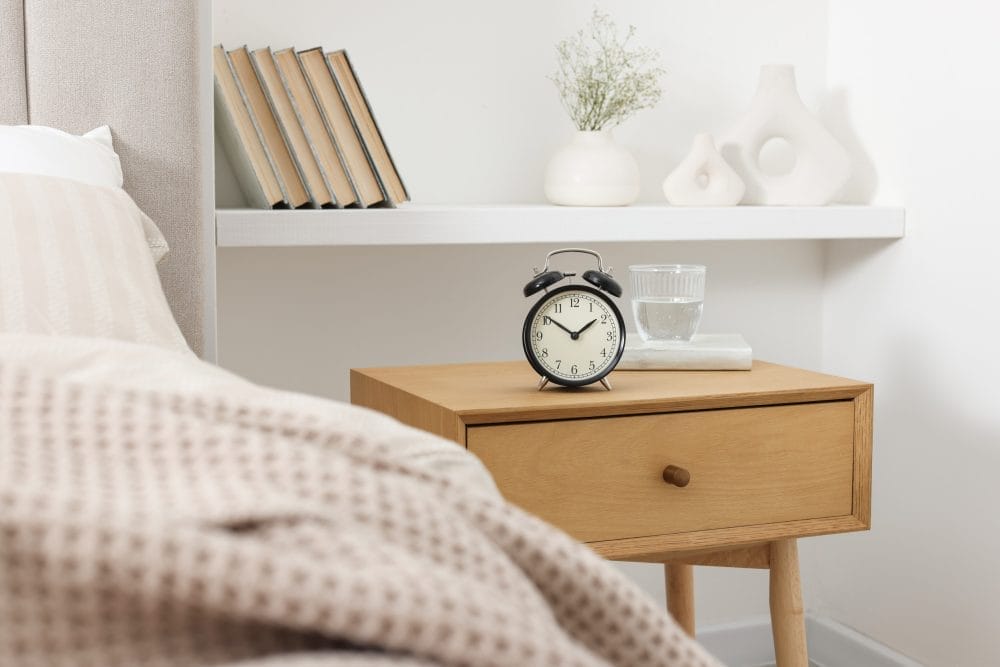There’s something almost sacred about the nightstand drawer. It’s a private space, always within arm’s reach, and often treated as a catch-all for life’s little necessities.
But while it may be tempting to stash everything from sentimental trinkets to everyday odds and ends in that small drawer, not everything belongs there. In fact, some items can compromise safety, hygiene, or even sleep quality if kept too close at night.
1. Prescription Medications
Storing prescription medications in a nightstand drawer might seem convenient, especially for those with nightly regimens. However, bedroom temperature fluctuations can degrade the effectiveness of certain drugs, especially in non-climate-controlled spaces. Children or pets could also gain access to them, posing a serious risk.
Medications are best kept in a cool, dry, and secure location, like a medicine cabinet with childproof features. Leaving them behind might make routines easier, but the potential risks outweigh the convenience.
2. Important Documents
Passports, social security cards, and other sensitive documents are far too valuable for the nightstand. A drawer designed for convenience isn’t the safest place for identity theft or emergency preparedness. These items should be locked away in a fireproof, waterproof safe or stored in a secure file cabinet.
In the unfortunate event of a burglary or house fire, the nightstand is often one of the first places criminals or flames reach. Keeping important documents there could lead to regret at the worst possible moment.
3. Spare Keys
It might seem logical to keep a spare house key nearby, especially in case of emergencies. But burglars are well aware of this habit and often check nightstands during home invasions. The drawer offers neither the security nor the discretion that spare keys require. Instead, a secure, hidden lockbox away from obvious locations is a far wiser choice. Leaving a key in the nightstand is like inviting trouble in with the door wide open.
4. Food or Snacks
While midnight cravings are real, storing snacks in the nightstand drawer can create an open invitation for pests. Crumbs and wrappers—even from sealed packages—can attract ants, roaches, or even rodents. The last place one should want an infestation is where sleep and relaxation happen. Food smells can also linger and make the drawer feel stale over time. A quick trip to the kitchen is worth avoiding the hygiene issues that come from stashing snacks bedside.
5. Electronics and Cords
Chargers, earbuds, and old phones often find their way into nightstand drawers, but they don’t belong there. Not only can tangled cords create clutter, but charging devices within enclosed spaces can pose a fire hazard.
Heat builds up when electronics are stowed without proper ventilation, especially overnight. Additionally, blue light from screens—if accessed during the night—can disrupt sleep patterns. A designated tech drawer elsewhere in the room makes for a safer, healthier solution.
6. Jewelry
The nightstand may seem like a convenient place to toss off rings or earrings before bed, but it’s risky for valuables. Drawers are easy to overlook during a rushed morning, making it easy to forget where treasured pieces were placed. Small items can also fall behind or between the drawer tracks, effectively disappearing. Furthermore, nightstands are obvious places for thieves to check during break-ins. Jewelry deserves a more secure and intentional storage location to preserve both its value and sentiment.
7. Candles or Matches
Keeping candles or matches on the nightstand may feel like a cozy touch, but it introduces an unnecessary fire risk. Accidental ignition is a very real danger, especially in a space filled with flammable materials like tissues, papers, or linens. Matches can also degrade and become unpredictable over time if exposed to moisture. Storing these items elsewhere ensures that the nightstand remains a restful, not risky, space. Safety should always come before ambiance when it comes to nighttime surroundings.
8. Personal Documents or Diaries
While it may feel intuitive to keep a personal journal on the nightstand, it’s important to think twice. These intimate writings are often deeply personal and deserve more privacy than a standard drawer can provide. If multiple people share the space or visitors come often, the drawer may not offer the discretion one assumes. Diaries or personal papers are also susceptible to spills or damage from cosmetics or water glasses, typically kept on nightstands. A bookshelf with a lock or hidden compartment offers a better blend of accessibility and protection.
9. Cash
It’s not uncommon for people to keep a bit of cash tucked away for emergencies, but the nightstand is far from ideal. In the event of a break-in, it’s one of the first places a thief will check. Additionally, storing cash loosely in a drawer exposes it to damage, loss, or accidental misplacement. There’s also a psychological effect—knowing money is nearby can tempt impulsive late-night spending habits. For emergency funds, a home safe or secure envelope in a more discreet location is much more practical.
10. Old Batteries
Used or half-dead batteries often get tossed into drawers with the intention of being sorted later. But these power sources can leak harmful chemicals over time, especially if exposed to moisture or heat. The leakage can damage nearby items or the drawer itself, creating a bigger mess than anticipated. It’s also a fire hazard to store batteries near flammable objects or stacked on top of each other improperly. Better to store batteries in a dry utility drawer, clearly labeled and routinely sorted.
How To Keep Your Nightstand And You Safe
The nightstand drawer should be a thoughtfully curated space, not a dumping ground. Keeping it free from potentially dangerous, damaging, or disruptive items helps create a more peaceful and secure sleep environment.
Every drawer tells a story—make sure yours is one of safety, clarity, and intention. By making small changes in how the space is used, bedtime can become a more restful and less stressful experience.
What would you never store in your nightstand drawer? Share your thoughts or comment below to keep the conversation going.
Read More
5 Low-Budget Upgrades for Your Primary Bedroom
5 Expensive Money Mistakes People Make When Moving Into a New House








